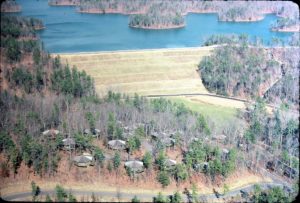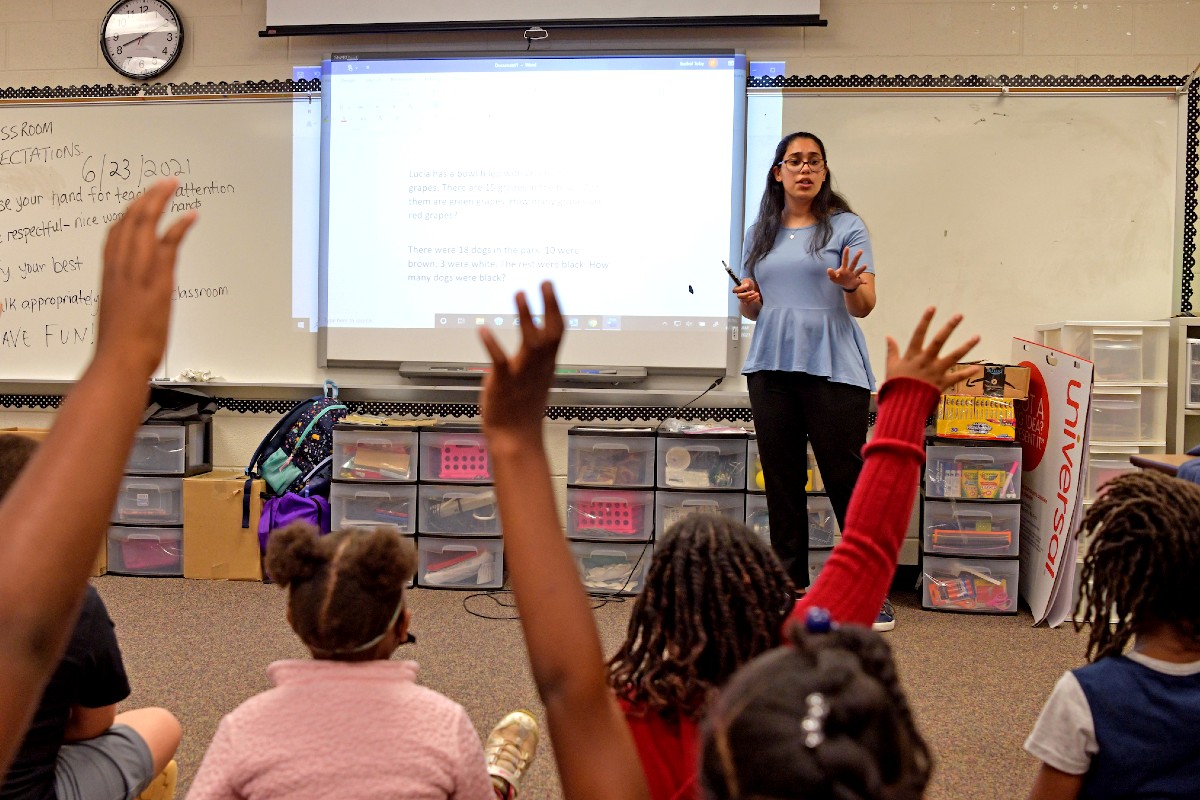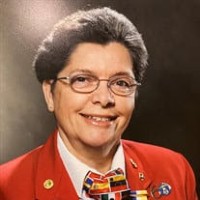GwinnettForum | Number 21.51 | July 2, 2021
AS A SOON-TO-BE TEACHER, Gracie Morgan, 23, of Lawrenceville, is among Georgia Gwinnett College students gaining experience this summer by tutoring students in the Gwinnett County Public Schools system. The summer program encourages the future teachers as they prepare for careers in the teaching field. For more details on this program, see Today’s Focus below.
TODAY’S FOCUS: GGC students tutoring GCPS students over the summer
EEB PERSPECTIVE: Fourth Estate is losing ground, which hurts democracy
ANOTHER VIEW: Better teaching of civics and government would help us all
SPOTLIGHT: Peach State Federal Credit Union
FEEDBACK: Will a new generation erase values of an older generation?
UPCOMING: Aurora Theatre planning barnburner events this summer
NOTABLE: Explore Gwinnett awards arts agencies $50,000 in grants
OBITUARIES: Grace Long Clower
RECOMMENDED: The Dogs that Made Australia by Guy Hull (from Louis Young)
GEORGIA TIDBIT: Georgia officials indignant about movie about chain gangs
MYSTERY PHOTO: Mystery Photo asks what type are these airplanes
CALENDAR: Signage renaming the Gwinnett Arena as the Gas South District will be July 7
GGC students tutoring GCPS students over the summer
By Ken Scar
LAWRENCEVILLE, Ga. | Students and graduates from Georgia Gwinnett College’s (GGC) School of Education (SOE) are partnering with Gwinnett County Public Schools (GCPS) to tutor middle-and-elementary-school children over the summer break. This is the first year GGC students from the School of Education have participated in the program.
The program aims to recruit “year one” teacher candidates and graduating student teachers admitted to the Educator Preparation Program in the School of Education.
Anita Anderson, assistant professor of curriculum and instruction and interim chair of clinical and field experiences for GGC, says students signed up through an application process handled through GCPS.“We are excited to partner with GCPS for this summer opportunity,” says Anderson. “We have almost 50 teacher candidates and graduates who are participating in the program. Our students will be working face-to-face with students as well as supporting digital learning students.”
Tutors were recommended by the program chairs. After attending orientation and pre-service training, the new tutors worked with in-service teachers to tutor groups of elementary and middle school students from June 14 – July 2. The tutoring was offered as part of the GCPS Enrichment and Acceleration program (SEA), a summer learning program that pairs GGC students with in-service teachers to tutor groups of elementary and middle school students.
The program gives education students and future teachers an opportunity to get additional in-field experience while helping children prepare for academic success in the coming school year.
 Gracie Morgan, at left, a senior studying special education, 23, from Lawrenceville, says she signed up because she loves working with children, and wanted experience working with elementary school students. “I believe this experience helped me before entering the workforce as a special education teacher,” says Morgan. “I hope the kids I tutored gained an excitement for the next school year, and I hope I can help prepare them enough to feel confident in themselves as they take on the challenges of the next school year.”
Gracie Morgan, at left, a senior studying special education, 23, from Lawrenceville, says she signed up because she loves working with children, and wanted experience working with elementary school students. “I believe this experience helped me before entering the workforce as a special education teacher,” says Morgan. “I hope the kids I tutored gained an excitement for the next school year, and I hope I can help prepare them enough to feel confident in themselves as they take on the challenges of the next school year.”
Perhaps the best aspect of the SEA program is that it’s as beneficial to the young students as it is to their tutors, says Anderson. “This hands-on opportunity gave our education students an opportunity to get additional in-field experience while helping children prepare for academic success in the coming school year.”
Morgan adds that she thinks the program is crucial after the year of COVID-19, because the ways students had to be taught — online and in socially distanced environments — were strained. “Upcoming Milestone Assessment scores are bound to show the dramatic effects of this school year,” she says. “The enriching and accelerating aspects of the SEA program will be hugely beneficial for these students. COVID-19 will have a ripple effect for many school years to come, so programs like this will become a necessity to both assist students in need and help advance students as well.”
- Have a comment? Send to: elliott@brack.net
Fourth Estate is losing ground, which hurts democracy
By Elliott Brack
Editor and Publisher, GwinnettForum
JULY 2, 2021 | Here on the eve of Independence Day, the Fourth Estate may be losing a battle that cannot help our American system of government. Unless it can be turned around, this battle will be adding to the woes, and may doom, our way of life in the United States of America.
![]() When our country started back in 1776, few media sites existed. The legislative, courts and executive branches operated with little oversight. There was no major national media that had an influence that media would have in coming years.
When our country started back in 1776, few media sites existed. The legislative, courts and executive branches operated with little oversight. There was no major national media that had an influence that media would have in coming years.
News in olden days usually traveled by word of mouth, and traveled very slowly. Our government operated pretty much in a vacuum. It wasn’t until 1838 that the telegraph was developed to send news quickly over wires. Even when the Civil War ended in 1865, we have noted recently that the people in Texas didn’t know anything about it until two months later. This led to what we now celebrate as Juneteenth Day.
From the 1820s, the penny press developed, delivered from high-speed presses, which could print thousands of newspapers cheaply. This eventually became a standard in large cities. By the turn of the century, newspapers flourished, with many practicing serious, objective journalism, and keeping a check on government.
In the 1920s era, the first commercial radio stations began, with a majority of U.S. households having a radio by 1931. Its stepchild, television (radio with a picture), was first broadcast in 1928, but did not gain ready acceptance until the 1950s.
The next major development in information was the internet, which since the mid-1990 has had a revolutionary impact on all the world.
Especially since World War II, people everywhere have been increasingly overwhelmed by the media. And a key part of what the media has done is alert its citizens to the operations of government. Nationwide, newspapers and commercial networks have readily kept an eye on the federal government, in the same manner that local weekly and local daily newspapers reported on lower levels of government.
These media made democracy something tangible. Often the subject of government was a big item, like proposed changes in health policy or Social Security. Or it could be a weekly newspaper telling its readers that a new $1 a month city garbage fee was being discussed. In these many ways, the citizens were being kept informed about their governments.
The people responded by voting. Not liking what the media reported about their government, the people changed their representatives. Approving of what their leaders were doing, the people voted them back into office.
But today, social media has changed all this, with people having less information, or questionable facts. The internet has drastically eroded advertising of newspapers and television, resulting in a cut in professional media staff levels, with fewer significant news stories reported. Many smaller communities have lost their local newspaper, and their radio station has no significant news reporting
The result is that people are taking what they see on social media as facts. It often is not factual, nor is it objective reporting.
It’s to the point that people can choose which prejudiced source they want to listen to or read, so as to reinforce their understanding. It divides our nation into camps of competing informational camps.
It all adds up that our government is watchdogged less by objective energies. It splits our people. It hurts our democracy. And it may doom us.
The Fourth Estate seems to be in a losing battle. When will it end? It may never.
- Have a comment? Send to: elliott@brack.net
Better teaching of civics and government would help us all
By John Titus
PEACHTREE CORNERS, Ga. | Recently I read an article entitled “Why We Need Civics” and was surprised and/or alarmed by some of the information it contained.
A survey of constitutional knowledge by the Annenberg Public Policy Center in 2020 reported that just over half of the respondents could name all three branches of government.
One basic gauge of civic knowledge is the naturalization test given to applicants for citizenship. From a list of 100 questions, they must answer correctly six out of ten multiple-choice questions chosen at random. Questions cover functions of government, history and public culture.
A 2018 survey by the Woodrow Wilson National Fellowship Foundation indicated that 90 percent of immigrants pass, but only 36 percent of native-born Americans succeed. Illustrating how civic education has declined over the last half-century, 74 percent of American-born seniors passed – but only 19 percent of people under 45.
What is taught about government varies widely among the states. Only nine states and the District of Columbia require a full year of civics in high school, Georgia and 30 others require a half-year, and 10 require nothing.
In 2020 Republican pollster Frank Luntz surveyed more than 1,000 Americans asking what could help bridge the political divide. Most agreed on better civic education. There the consensus breaks down. Democrats prioritize teaching American government, emphasizing learning the rules and how to change them. Republicans emphasize teaching American history, celebrating how our government came to be and preserving it.
Perhaps the most alarming information was that a 2018 survey by the Knight Foundation and Georgetown University found the following: Fewer than 30 percent of Americans under the age of 40 believe it is essential to live in a democracy, and one in four young people do not think it is important to choose our leaders through free elections.
Whether we have children in school or not, this issue should concern us all.
- Have a comment? Send to: elliott@brack.net
Peach State Federal Credit Union
 The public spiritedness of our sponsors allows us to bring GwinnettForum.com to you at no cost to readers. Peach State Federal Credit Union is a $734 million credit union that serves more than 68,000 members throughout Georgia and South Carolina. Operating as a not-for-profit financial cooperative, Peach State’s mission is to provide quality financial services that meet the needs and exceed the expectations of its member-owners.
The public spiritedness of our sponsors allows us to bring GwinnettForum.com to you at no cost to readers. Peach State Federal Credit Union is a $734 million credit union that serves more than 68,000 members throughout Georgia and South Carolina. Operating as a not-for-profit financial cooperative, Peach State’s mission is to provide quality financial services that meet the needs and exceed the expectations of its member-owners.
- For a list of other sponsors of this forum, click here
Will a new generation erase values of an older generation?
Editor, the Forum:
![]() Your comments about consideration for others holding Sunday specials got my attention. We remember the days of Donna Reed and My Three Sons, days of wearing a coat and tie to church, sitting next to dad at church, followed by a good meal. We cut the next-door lady’s grass for nothing, we ran errands for her. Your comments seemed to be more; they seemed to be passages.
Your comments about consideration for others holding Sunday specials got my attention. We remember the days of Donna Reed and My Three Sons, days of wearing a coat and tie to church, sitting next to dad at church, followed by a good meal. We cut the next-door lady’s grass for nothing, we ran errands for her. Your comments seemed to be more; they seemed to be passages.
I remember growing up in Richmond, Va. I was seeking out older guys to hear their stories and point of view. The Great Generation was slipping through our fingers and when they were gone the treasure of their lives would go with them. I called it passage. It is the juice, the baton that one generation passes to the next. I worry that few of our generation are held in esteem by the generation to follow. There is no interest in the past; they see valueless or abandoned values.
Will the new regime erase what we valued? Will the baton be dropped? Will there be passage?
— Byron Gilbert, Duluth
Send us your thoughts: We encourage you to send us your letters and thoughts on issues raised in GwinnettForum. Please limit comments to 300 words, and include your hometown. The views of letters are the opinion of the contributor. We reserve the right to edit for clarity and length. Send feedback and letters to: elliott@brack.net.
Aurora Theatre planning barnburner events for July
Aurora Theatre in Lawrenceville brings the heat with barnburner events in July. Indoor and outdoor events fill the summer schedule.
CASH/CARTER: A Concert Tribute: Thursday – Friday, July 1 and 2 at 7:30 p.m.
Saturday, July 3 at 2:30 p.m. and 8 p.m. Tickets start at $35 per person (1-4 person pods available) for this Aurora Mainstage performance.
CHRISTMAS CANTEEN IN JULY: An Aurora Original, to be held Saturday, July 24 at 7:30 p.m. Tickets start at $20 per person. There is a VIP Tent (6 chairs and a table; or premium seating (first three rows, chairs provided); or General Admission (bring your own chair). This will be held at the
Lawrenceville Arts Center Courtyard.
AURORA COMEDY NIGHTS: Mike Albanese: Friday, July 9 and 10 at 8 p.m. Tickets start at $15 per person (1-4 person pods available), and this will be on the Aurora Mainstage.
BREW HA-HA in the Aurora biergarten: Tuesday, July 27 at 7 p.m. Tickets start at $20.
Disney’s MOANA JR.: Friday – Saturday, July 23 and 24, 2021, Friday at 11:30 a.m. and 4 p.m.; Saturday at 11:30 a.m. and 2 p.m. Tickets: $10. Will be at the Lawrenceville Arts Center Courtyard
Continuing in July:
- Lawrenceville Ghost Tours summer chills and thrills.
- Aurora Children’s Playhouse summer 2021 on the Lawrenceville Lawn.
Audiences will be required to wear masks for all indoor events. Indoor performances at Aurora Theatre are available in reserved pod seating. Patrons can choose their seating pod online. Attendees will also be able to see which seats are blocked out to create social distance. At events located outdoors, attendees are encouraged to dress appropriately for the weather and may need to bring their own chair. Tickets for all of these events are on sale by clicking here.
- For more information on programming, please call the Box Office at 678-226-6222 or visit auroratheatre.com.
Be warned of scammers trying to con utility customers
Jackson EMC has received reports of members receiving phone calls from scammers claiming to be from the cooperative and urging members to pay a bill immediately or face being disconnected from power service. Members should be aware of the rise of this recent scam to avoid becoming a victim.
 The scammer may pretend to be from Jackson EMC or another utility. Be aware that some may even use caller ID to appear as though the call came from Jackson EMC.
The scammer may pretend to be from Jackson EMC or another utility. Be aware that some may even use caller ID to appear as though the call came from Jackson EMC.
If members are concerned about a past-due bill, they should call Jackson EMC at 1-800-462-3691. Jackson EMC members may also use the “MyJacksonEMC” website or mobile app to check their current bill balance.
While the phone calls can be very convincing, there are signs to spot a scam:
- Urgency: Scammers tell you to act fast – typically while you’re still on the phone with them. Hang up and call the customer service number on your bill or your utility company’s website. Jackson EMC: 1-800-462-3691.
- Threatening to Disconnect Your Power: Scammers may say that your electricity will be turned off very soon without immediate payment.
- Personal Information: At some point, scammers may ask for your credit card number, Social Security number or account number. You should only provide this type of information in phone calls you initiate with trusted companies.
- Requesting Payment with a Prepaid Credit Card: Jackson EMC will never call you and tell you to pay your bill with a prepaid credit card, like Green Dot or MoneyPak. Scammers often target non-English speaking members and ask them to pay with a Green Dot card. For acceptable ways to pay your bill, visit jacksonemc.com/waystopay.
Explore Gwinnett awards arts agencies $50,000 in grants
Explore Gwinnett has awarded $50,000 in grants to eight Gwinnett County non-profit arts and culture organizations through its Gwinnett Creativity Fund. These awards will assist organizations to continue and grow their operations, as well as supporting continued post-COVID recovery.
 Lisa Anders, Explore Gwinnett executive director, says: “Explore Gwinnett will continue to award grants that help spread art and culture throughout Gwinnett County. These organizations have showed true resilience and creativity through their continued programming.”
Lisa Anders, Explore Gwinnett executive director, says: “Explore Gwinnett will continue to award grants that help spread art and culture throughout Gwinnett County. These organizations have showed true resilience and creativity through their continued programming.”
Organizations receiving grants include:
- Aurora Theatre, $14,000: Founded in 1996, Aurora Theatre houses two performance spaces, boasts 5,000 season ticket holders, produces over 850 events annually and entertains 80,000 visitors.
- The Hudgens Center for Art and Learning, $11,500: Founded in 1981, the Hudgens brings art lovers, leaders, and learners together through quality programs and exhibitions
- Gwinnett Ballet Theatre, $7,000: Gwinnett Ballet Theatre was founded in 1977 and is one of the oldest non-profit arts organizations in Gwinnett County.
- Suwanee Arts Center, $5,000: Established in 2010, its purpose is to bring artists and art lovers to promote the appreciation of local art through arts education, exhibition, festivals, and art events.
- Suwanee Performing Arts, $5,000: Founded in 2007, it provides performance opportunities to, and by, the citizens of Gwinnett County.
- Live Arts Theatre Inc., $2,500: Founded in 1993, Live Arts Theatre is a teaching theatre necessary in the field of professional theatre.
- Norcross Gallery and Studios, $2,500: Previously known as Kudzu Art Zone and founded in 2006, it focuses on the support and advancement of local art and artists.
- Southeastern Railway Museum, $2,500: Georgia’s official transportation museum since 1970, it provides an educational atmosphere of transportation to the region.
Impact 46 gets June grant from Gwinnett Stripers
The Gwinnett Stripers, in conjunction with the Atlanta Braves Foundation, have awarded their $2,500 June grant to Impact46 of Lawrenceville. The faith-based nonprofit focuses on education, employment, and community development to impact communities and improve cities.
In 2020, Impact46 teamed up with community partners and the City of Lawrenceville to create the Lawrenceville Response Center to help stabilize families who had lost employment because of the COVID-19 pandemic. Impact46 has assisted over 1,200 people while providing over $1 million in rental assistance to help families facing eviction and/or homelessness in Gwinnett County. The organization is committed to serving the citizens of Gwinnett County as they recover from the pandemic by focusing on stabilization services and access to livable wages.
- Have a comment? Send to: elliott@brack.net
Grace Long Clower
Grace Long Clower, age 72 of Snellville, Georgia, passed away on Saturday, June 26, 2021.
Summarizing Grace Long Clower’s life’s activities resembles a nomination for Volunteer of the Year. This Snellville lady was a tireless and lifelong contributor to a number of organizations that she deemed worthy. She worked energetically and without fanfare behind the scenes to produce tangible results for her non-profit groups.
Grace was born as one of seven children to Aubrey and Merdie Long in Grayson, where she grew up and attended elementary school. She graduated from South Gwinnett High School in 1966, where she played basketball. She married fellow SGHS alumnus Woody Clower, and they had 35 years together before his untimely death. She was preceded in death by parents, Clarence Aubrey and Merdie Lou Carroll Long; sister, Barbara Miller; brother, Billy Long; son, James Eric Clower; husband, Woody Clower; and in-laws, Emmett and Annette Clower. She is survived by her son, Tom and his wife Katie; grandchildren, Braylon Clower and Ellie Clower; sisters and brothers, Virginia and Delmar Gilbert of Monroe, GA, Pat and Judy Long of Grovetown, GA, Gail and Wayne Manning of Monroe, GA, Jean and Steve Lark of Loganville, GA; sister-in-law, Bonnie Ruth Long of Flowery Branch, GA; brother and sister-in-law, Leo and Margaret Miller of Monroe, GA, brothers-in-law, William Emmett Clower, Jewett and Wanda Clower, Jeffrey and Margaret Clower; and numerous nieces and nephews.
Grace was a 34-year member of the Snellville Lions Club, having served as President, Vice President, Director, and Chaplain of the local club. In the Northeast Georgia District, she has served as Zone Chair, Region Chair, Vice-District Governor, and District Governor. As a Certified Guiding Lion, she helped to establish several new Lion Clubs. She was serving as the Georgia Global Leadership Coordinator.
In recognition of her efforts, she had received many awards including; Progressive Melvin Jones Fellow, the highest award in Lionism; two International President’s Certificates of Appreciation; the International President’s Leadership Medal; the International Presidential Medal; and the Georgia Ervin-Crumbley Award.
She has served as Chair of the Board of Directors of the Georgia Lions Lighthouse Foundation. She led the project to erect a bench in front of Snellville City Hall in celebration of the Lions Clubs International 100th Anniversary. She was serving as Area Leader over seven southeastern states and the islands of the Caribbean in the Lions Club International Foundation Campaign 100 to secure donations for the foundation’s humanitarian efforts.
Grace was a 49-year member of the Snellville United Methodist Church. Over the years. She has served as Chair of the Board of Trustees, Co-Chair of the 2016 Vision Committee, Assistant Lay Leader, Adult Sunday School Teacher, worked with the Children’s Ministry, member of the Church Archives/History Committee, and member of the Kitchen Angels. She was serving as Chair of the Church Council and was a member of the United Methodist Women’s Organization.
In the past years she had volunteered at the Southeast Gwinnett Cooperative Ministry, coached a girls’ and boys’ basketball, and adult softball teams, served as a mentor for 8th grade students at Craig Middle School, and worked as a poll worker for City and County elections. She was awarded Volunteer of the Year in 2013 from Snellville Trade and Tourism, and she received a City of Snellville Proclamation recognizing her volunteer work.
Grace was the former President of the Snellville Historical Society. During her tenure, she facilitated the relocation of the society’s office and archives from City Hall to the historic home of Edwin and Mabel Snell, which was made available through the generosity of the E.R. Snell family.
The memorial service to honor and celebrate the life of Grace Long Clower was held on Wednesday, June 30, 2021 at Snellville United Methodist Church, Memorial donations may be made to Georgia Lions Lighthouse Foundation, Inc., 5582 Peachtree Road, Chamblee, Ga. 30341 or Snellville UMC, Inc., 2428 Main Street, East, Snellville 30078, in loving memory of Grace Clower. The Lions Club and the Friendship Sunday School class served as honorary escorts.
Condolences may be sent or viewed at www.wagesfuneralhome.com. Tom M. Wages Funeral Service.
The Dogs that Made Australia by Guy Hull
![]() From Louis D. Young Jr., Lilburn: The British, after beginning to settle Australia, had a serious problem with providing food for the new colony. They had issues with managing the livestock they imported and the dogs they imported with them. The British dogs could not handle the climate in Australia. As a result, they began the process of cross- breeding to develop more suitable dogs. They crossed the Dingo, the wild dog of Australia, with a Blue Merle Collie and a Dalmatian to develop a working dog to herd cattle. This is now known as the Australian Cattle Dog. They can deal with both very cold climates as well as very hot climate areas. The Australian Kelpie is another herd dog that worked well with sheep and is very well adapted to the climates found in Australia. Unfortunately, some of the original breeding records no longer exist, so totally accurate information can’t be verified.
From Louis D. Young Jr., Lilburn: The British, after beginning to settle Australia, had a serious problem with providing food for the new colony. They had issues with managing the livestock they imported and the dogs they imported with them. The British dogs could not handle the climate in Australia. As a result, they began the process of cross- breeding to develop more suitable dogs. They crossed the Dingo, the wild dog of Australia, with a Blue Merle Collie and a Dalmatian to develop a working dog to herd cattle. This is now known as the Australian Cattle Dog. They can deal with both very cold climates as well as very hot climate areas. The Australian Kelpie is another herd dog that worked well with sheep and is very well adapted to the climates found in Australia. Unfortunately, some of the original breeding records no longer exist, so totally accurate information can’t be verified.
- An invitation: what books, restaurants, movies or web sites have you enjoyed recently? Send us your recent selection, along with a short paragraph (150 words) as to why you liked this, plus what you plan to visit or read next. Send to: elliott@brack.net
Georgia officials indignant about movie about chain gangs
(From previous edition)
A motion picture version of Robert Elliott Burns’ book, I Am a Fugitive from a Georgia Chain Gang!, was put into production shortly after the book’s publication, directed by Mervyn LeRoy and starring one of Hollywood’s finest actors, Paul Muni, in the title role. Burns himself went incognito to serve as a consultant on the film.
 As indignant as Georgia officials were over the book’s publication, they were even more upset over the movie, and they insisted that Warner Brothers drop “Georgia” from the film’s title. Upon the movie’s release in late 1932—during one of the darkest periods of the Great Depression and days after the election of U.S. president Franklin D. Roosevelt—the theaters could not screen it often enough. A telegram to Warner Brothers in Hollywood told the tale: “fugitive biggest Broadway sensation in last three years stop thousands turned away from box office tonight with lobby delay held four hours stop.”
As indignant as Georgia officials were over the book’s publication, they were even more upset over the movie, and they insisted that Warner Brothers drop “Georgia” from the film’s title. Upon the movie’s release in late 1932—during one of the darkest periods of the Great Depression and days after the election of U.S. president Franklin D. Roosevelt—the theaters could not screen it often enough. A telegram to Warner Brothers in Hollywood told the tale: “fugitive biggest Broadway sensation in last three years stop thousands turned away from box office tonight with lobby delay held four hours stop.”
In spite of its rather stilted script, the film was one of the major achievements of 1930s Hollywood. LeRoy had just completed Little Caesar, the first great work in a new genre, the gangster film, while Muni himself had just completed another classic gangster picture, Scarface. Thus, both star and director were moving from the founding of one genre toward establishing a second, the southern prison adventure.
Fugitive was named Best Picture of the Year by the National Board of Review of Motion Pictures. Muni and the film received three Oscar nominations. It was remade in 1987 under the title The Man Who Broke 1,000 Chains (HBOFilms, directed by Daniel Mann). Scenes, themes, and motifs from the 1932 LeRoy picture also abound in Cool Hand Luke (1967, Warner Brothers, directed by Stuart Rosenberg).
Burns was apprehended yet again in December 1932 in Newark, but the state of New Jersey refused to extradite him, despite the insistence of Georgia officials. After two other failed attempts to bring him back to Georgia, Burns met newly elected Georgia governor Ellis Arnall in New York in 1943 and requested a pardon. Arnall arranged to have Burns return to Georgia in November 1945 to face the parole board, where he stood by Burns’ side as his counsel. The board commuted Burns’ sentence to time served. Governor Arnall’s gesture capped an administration devoted to prison reform, including the abolition of chain gangs. Burns died on June 5, 1955, at his home in Union, N.J., where he had worked as a tax consultant.
- To view the Georgia Encyclopedia article online, go to http://georgiaencyclopedia.org
Mystery Photo asks what type are these airplanes
These airplanes are hanging from a ceiling, and are this issue’s Mystery Photo. Not only does GwinnettForum want to know where this photograph was taken, but can you identify these airplanes Send your answer to elliott@brack.net to include your hometown.
 Allan Peel of San Antonio, Tex. wrote succinctly about the last Mystery Photo. “Today’s mystery photo shows the ‘Treetoppers’ properties in Big Canoe, a private residential community at the base of the dam that forms Lake Petit in the North Georgia mountains in Pickens County, approximately 60 miles north of Atlanta. Big Canoe is located approximately half-way between Jasper and Dawsonville and has about 3,000 residents, 60 percent of which are ‘full-timers’ and the remaining 40 percent are ‘weekenders.’
Allan Peel of San Antonio, Tex. wrote succinctly about the last Mystery Photo. “Today’s mystery photo shows the ‘Treetoppers’ properties in Big Canoe, a private residential community at the base of the dam that forms Lake Petit in the North Georgia mountains in Pickens County, approximately 60 miles north of Atlanta. Big Canoe is located approximately half-way between Jasper and Dawsonville and has about 3,000 residents, 60 percent of which are ‘full-timers’ and the remaining 40 percent are ‘weekenders.’
“This area was first developed in the 1830s by Samuel Tate (1860-1938) when he discovered the area was ripe with marble and he opened up a quarry in 1850 in Tate, Ga. The family would eventually open up the Georgia Marble Company in 1884 in response to growing business still in operation today, which triggered the construction of Marietta and the North Georgia Railway.
“By the mid-20th century, the area developed by the Tate family had become known as the Wolfscratch Property, and had lay unused for a number of years, when in 1972 Cousins Properties in Atlanta and the Sea Pines Corporation of Hilton Head partnered up to create the gated community of Big Canoe, Ga.Prominent in the mystery photo are the homes and cottages known locally as ‘Treetoppers’, which are some of the first houses that were built in the area. The octagon-shaped style homes got their name in part because the entire home has a bird’s eye view from the treetops perched on the side of the mountain.”
George Graf of Palmyra, Va. added: “Lake Petit area is known as Big Canoe to honor the Native American heritage that was once a large part of the area. The area that is now Big Canoe Community was once inhabited by the Paleo Native Americans who left behind a set of rock mounds which can still be seen to this day at Indian Rocks Park. Sometime after the Paleo Native Americans moved on, the Cherokee took up residence until they were relocated in the 1830s.”
Another recognizing the photo was Lou Camiero of Lilburn.
![]() Unveiling ceremony of new signage renaming the Gwinnett Arena as the Gas South District will be Wednesday, July 7, at 10:30 a.m. Scheduled to speak at the event are Gas South, president and CEO; Kevin Greiner; Gas South District COO Stan Hall; and chairwoman of Gwinnett County Board of Commissioners, Nicole Love Hendrickson.
Unveiling ceremony of new signage renaming the Gwinnett Arena as the Gas South District will be Wednesday, July 7, at 10:30 a.m. Scheduled to speak at the event are Gas South, president and CEO; Kevin Greiner; Gas South District COO Stan Hall; and chairwoman of Gwinnett County Board of Commissioners, Nicole Love Hendrickson.
Mayor’s Panel will be July 9 at the South Gwinnett Chamber of Commerce at 7:30 a.m. The meeting will be held at Atlanta Tech Park, 107 Technology Parkway in Peachtree Corners. This will be a panel discussion of the common issues of the cities Peachtree Corners, Norcross and Berkeley Lake that are the Gateway to Gwinnett. Mayors Mike Mason, Craig Newton and Lois Salter will be on the panel.
GwinnettForum is provided to you at no charge every Tuesday and Friday.
Meet our team
- Editor and publisher: Elliott Brack, 770-840-1003
- Managing editor: Betsy Brack
- Roving photographer: Frank Sharp
- Contributing columnist: Jack Bernard
- Contributing columnist: Debra Houston
- Contributing columnist: George Wilson
More
- Mailing address: P.O. Box 1365, Norcross, Ga. 30091
- Work with us: If you would like to serve as an underwriter, click here to learn more.
Subscriptions to GwinnettForum are free.
- Click to subscribe.
- Unsubscribe. We hope you’ll keep receiving the great news and information from GwinnettForum, but if you need to unsubscribe, go to this page and unsubscribe in the appropriate box.
© 2021, Gwinnett Forum.com. Gwinnett Forum is an online community commentary for exploring pragmatic and sensible social, political and economic approaches to improve life in Gwinnett County, Ga. USA.

















Follow Us